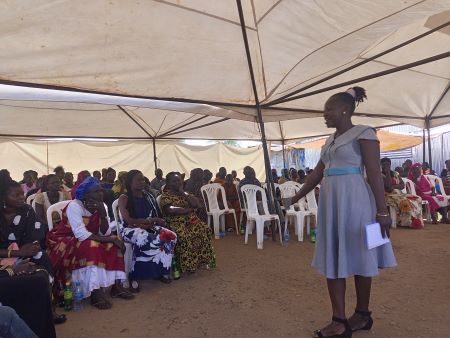Stigma, lack of confidentiality limits gender-based violence fight
November 26, 2023 (MAUNA) – Majority of gender-based violence cases in South Sudan are not being reported due to stigma associated with cultures and lack of confidentiality, residents of the Mauna area in Juba resolved.
At a community awareness program conducted by South Sudan Sudan Law Society (SSLS) and Legal Action Worldwide (LAW) in Mauna, rape and child marriages emerged as alarming cases of gender-based violence.
The European Union (EU) funded project drew more than 100 residents.
Oliver Taban from SSLS said the community awareness session was to inform the public about the work of the Justice Confidence Centre (JCC).
“These awareness sessions help communities to understand the basic concepts of gender-based violence and the service providers,” he stated.
Taban stressed the need to develop and strengthen legal aid services specializing in tackling gender-based violence-related cases in the country.
According to a 2018 study, violence against women and girls in South Sudan remains an endemic problem inhibiting the full participation of women in decision making at the community, economy and society in general.
“There is an acute need to improve women’s knowledge of their rights, and opportunities for them to demand, access and enforce their rights,” it noted.
The Mauna area chief, Bidal Fraizer said gender bias and the culture of impunity explains the low rate of reporting gender-based violence cases.
“Poverty also leads to more gender-based violence, including child marriage, often for bride price, sexual exploitation and abuse, or limited access to sexual and reproductive health rights,” he said on Saturday.
Bidal, however, stressed the need for people to report gender-based violence but they become more conservative in the South Sudan society where women do not report anything to do with rape or even GBV cases.
Jennifer Elimani, a facilitator, said GBV is deeply rooted in gender inequality, harmful social and gender norms and a highly patriarchal community and legal systems, compounding violence against women.
“GBV is driven by discriminatory social norms and power inequalities between men and women, and compounded by a highly patriarchal legal system and the use of customary laws that often condone GBV,” she said.
Elimani called for provision of in-depth training to targeted influencers in the communities and more awareness raising on GVB and its consequences.
Mary John, a resident of the Mauna area, emphasized the need to put in place and support customary courts to handle and refer GBV-related cases.
Up to 90 % of GBV cases are heard in customary courts presided by older male judges who have deeply ingrained patriarchal views, and which generally condone domestic violence, a study conducted by SSLS showed.
“This discourages women from seeking justice but it also leads to women accusing their husbands of excessive abuse to being sentenced and sometimes being punished more harshly than their husbands,” it stressed.
South Sudan accounts for the second highest prevalence case of GBV in the region. According to a 2018 study, substantial proportions of women (aged 15-64) in South Sudan experience gender-based violence either in the form of physical (34.0%) or sexual (13.5%) violence in their lifetime.
(ST)

